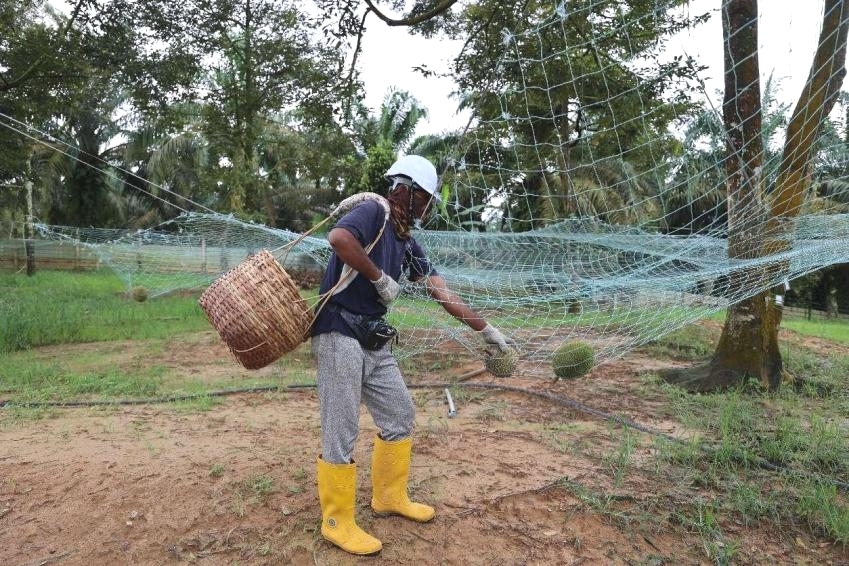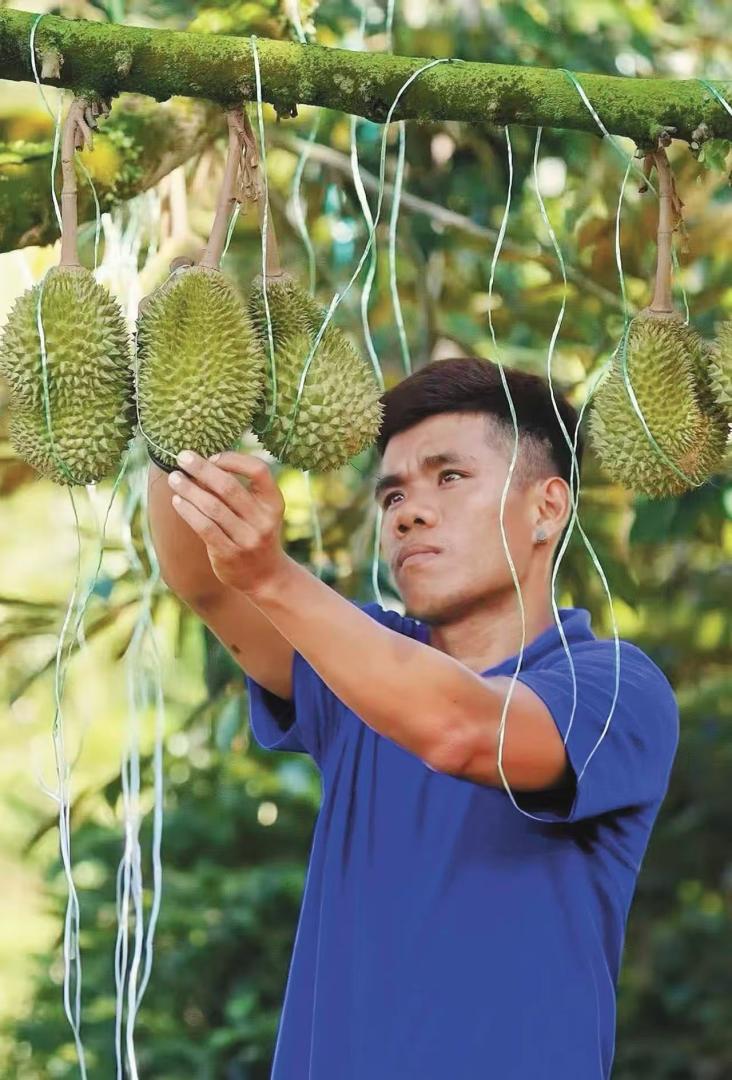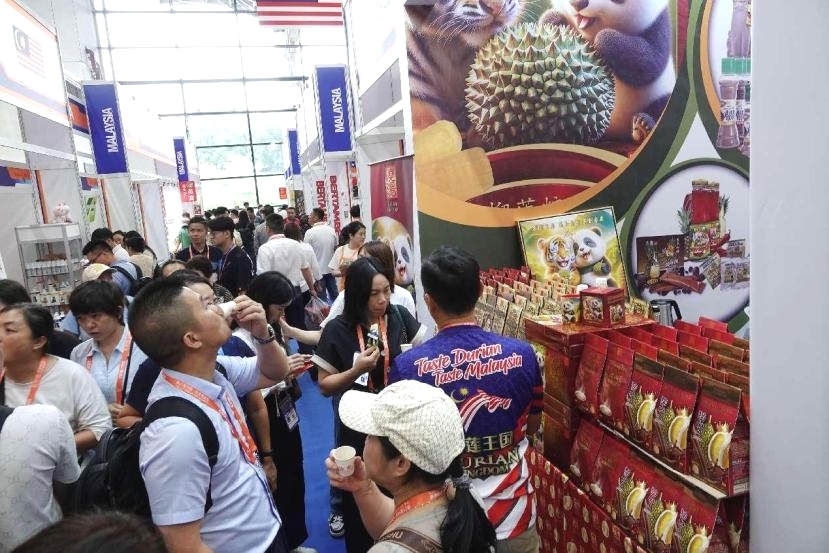




- BRNN
- BRI News
- BRNN News
- Database
Official Documents Polices and Regulations
Inter-government Documents International Cooperation BRI Countries
Business Guide Economic Data BRI Data
Trade
Investment Projects Latest projects
Cases - Content Pool

A worker of Top Fruits Sdn. Bhd., a durian supplier in Malaysia, harvests durians. (Photo by Huan Xiang/People's Daily)
In Raub, Pahang, two hours northeast of Malaysia's capital Kuala Lumpur, the pungent scent of promise hangs in the air. Durian trees, now flowering in the early heat of April, are being carefully pruned and pollinated by farmers. In about 90 days, the ripened fruits will be packed and shipped across the ocean, making their way to shopping carts in China.
Since China opened its doors to frozen Malaysian durians in 2019, the fruit has soared past cherries to become the country's top-selling imported fruit. The surge in appetite has sparked a wave of innovation and closer partnerships between the two countries.
Among the new players is Muhua Sdn. Bhd. Malaysia, a trading company founded in 2021 to ride the durian wave. However, after diving deeper into the business, the company's general manager Jiaqiang Wang discovered a challenge: grading a durian's quality was less science than guesswork. With its thick skin and unpredictable flesh, determining which fruit would meet customer expectations depended entirely on the intuition of experienced hands - resulting in high spoilage, logistical headaches, and a growing list of dissatisfied buyers.
The turning point came at the sixth China International Import Expo (CIIE) in Shanghai. At a side forum hosted by Nuctech, a Chinese security and inspection solution supplier, an innovative idea began to take shape: what if the same technology used to scan luggage could be used to scan durians?
Over the following year, the two companies co-developed "Durian Detective," a non-destructive 3D detection system that merges CT scanning with AI image recognition. The system assesses 20 indicators - from core size and hollowness to signs of pests or rot - and assigns each fruit a unique "quality ID card." With an accuracy rate of over 98 percent, it is 40 times more precise than traditional manual inspection.

In Raub, Pahang, Malaysia, a farmer ties durians to the tree branches to prevent them from falling prematurely. (Photo provided by the interviewee)
Malaysia's durian industry is embracing digital transformation on multiple fronts. Top Fruits Sdn. Bhd., a durian supplier in Malaysia, is now using AI-driven tools in collaboration with the Malaysian branch of Xiamen University to monitor durian growth.
In the company's office, a dashboard displays real-time photos of every durian tree on the farm. Clicking on the images, one could clearly see the number of blossoms and budding fruits. "We regularly upload photos of the growing progress, and the system analyzes them intelligently to make predictions," explained Tan Xue Yi, the company's plantation R&D lead. "This allows us to plan ahead and improve efficiency."
According to Tan Sue Yee, head of the company, the payoff has been swift. "Since August last year, Malaysian fresh durians have been reaching Chinese consumers as quickly as the day after they're picked, and our orders have soared."
In 2023, Malaysia exported 1.92 billion yuan ($262.73 million) worth of frozen durians to China - seven times the amount in 2018. As Chinese demand continues to surge, Malaysian farmers are planting more trees, while rural youth are returning to hometowns to start businesses, spurred by tech-driven agriculture and booming e-commerce channels.
Meanwhile, Malaysian exporters are increasingly open to settling durian deals in Chinese yuan, supported by local banks offering RMB-denominated letters of credit.

Photo taken on Sept. 24, 2024 shows visitors selecting products at the booth of Malaysia during the 21st China-ASEAN Expo in Nanning, south China's Guangxi Zhuang autonomous region. (Photo by Yu Xiangquan/People's Daily Online)
The booming durian trade is a vivid example of deepening China-Malaysia economic ties. In 2024, bilateral trade reached a record high of $212.04 billion, marking an 11.4 percent year-on-year increase. China has been Malaysia's largest trading partner for 16 consecutive years and remains one of Malaysia's top investors, while Malaysia remains China's second-largest trading partner and the largest source of imports within ASEAN.
The implementation of the Regional Comprehensive Economic Partnership (RCEP) has further expanded market access between China and Malaysia. China's massive market and ongoing upgrades in consumption are unlocking more opportunities for trading partners like Malaysia.
Malaysian companies have been actively participating in major Chinese expos such as the CIIE and the China-ASEAN Expo, bringing signature products like white coffee, mangosteen, bird's nest, and palm oil into millions of Chinese households. In turn, Malaysian consumers are now enjoying Chinese fruits such as apples, fragrant pears, and plums - demonstrating a robust two-way exchange.
"Malaysia and China have created a truly win-win partnership," said Malaysia's Economy Minister Rafizi Ramli. In recent years, Chinese companies have steadily ramped up investment, expanded their footprint, and delivered solid returns in Malaysia, contributing significantly to the local economy.
"Today, both countries are well-positioned to deepen cooperation and drive development together," he added.

Tel:86-10-65363107, 86-10-65368220, 86-10-65363106